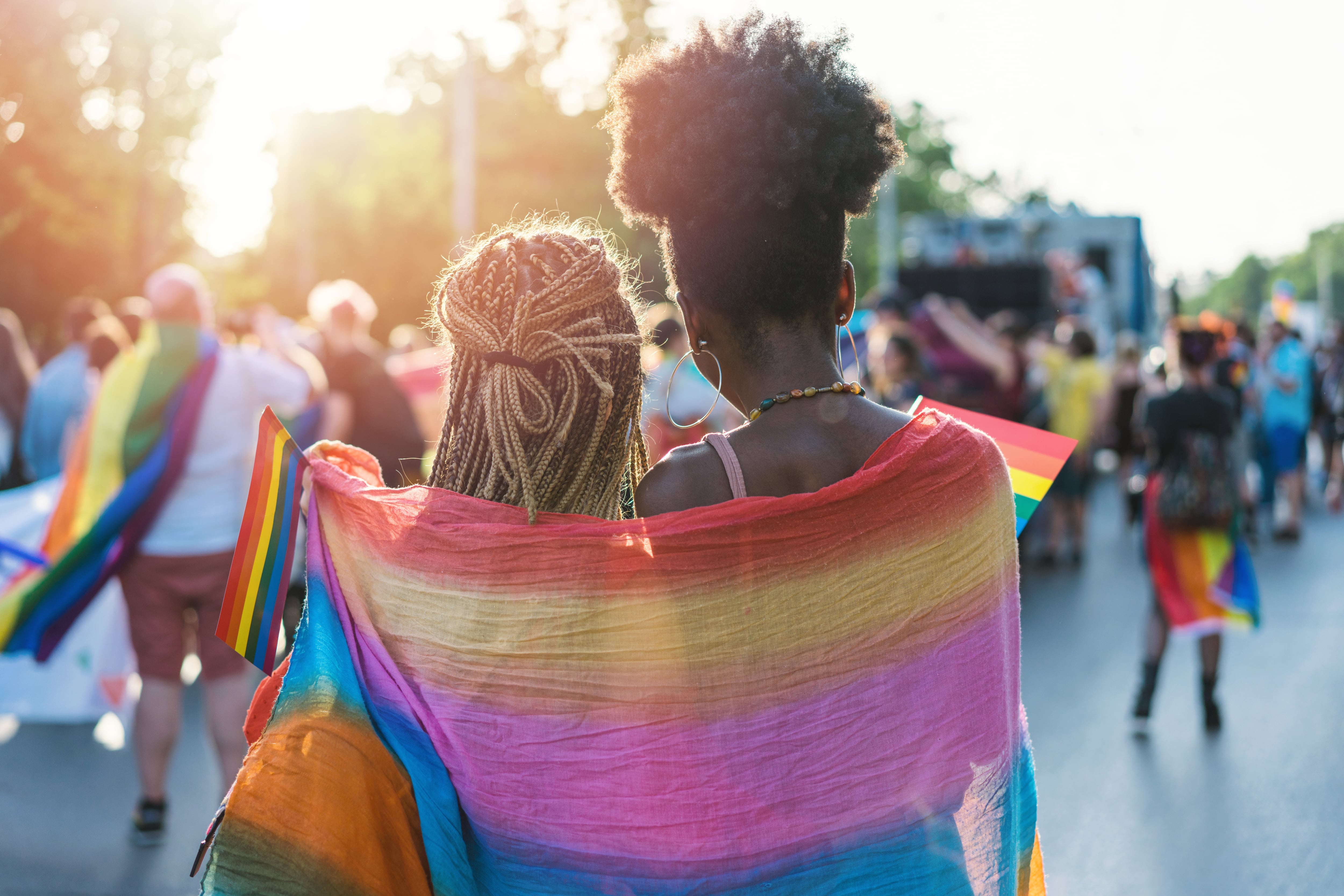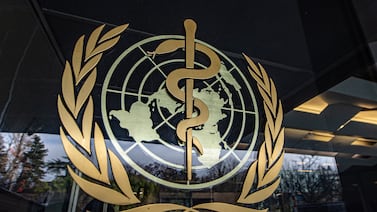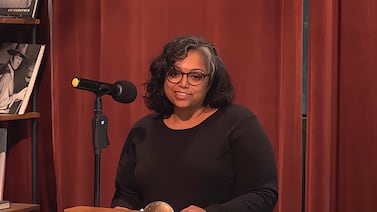This story originally appeared at Capital B Atlanta. Public health, explained: Sign up to receive Healthbeat’s free Atlanta newsletter here.
As lawmakers push for sweeping cuts to Medicaid, fear weighs heavily on Tori Cooper.
Cooper, a trans woman who serves as the director of strategic outreach and training for the Human Rights Campaign, told Capital B Atlanta that for her and other Black trans residents, these cuts will have a detrimental impact on their lives.
“The Black LGBTQ community will be greatly impacted, and Black trans folks even more so,” said Cooper. “For years, we’ve acknowledged how systematic racism impacts the lives of Black LGBTQ people. Inequity and racist ideology and policies have traditionally led to worse health outcomes for poor, less educated, underemployed people and those of us who live in the South.”
Last month, congressional House Republicans passed a bill that would cut billions over the next 10 years from Medicaid, the federal-state health care insurance program that helps pay for health care for low-income people. The bill also would prohibit gender transition care from being covered by the program.
“I worry that preventable health conditions like HIV will ravage my community,” Cooper said. “I worry that Black trans people will lose some of the social and political traction that our transestors fought for. I worry that my Black trans family will have to go back into the proverbial closet for safety. Closets are made for clothes, not people.”
Cooper worries that in a place like Georgia, where HIV rates are high and access to health care is already difficult due to the Georgia General Assembly’s refusal to expand Medicaid, the Black LGBTQ+ community will be one of the vulnerable and bear the brunt of these looming cuts.
In 2023, about 1 in every 4 Black Georgians was covered by Medicaid, compared to about 1 in every 10 white Georgians, according to the State Health Access Data Assistance Center.
Nationally, Black LGBTQ residents are twice as likely to be enrolled in Medicaid compared to the general population, Victoria Kirby York, director of public policy and programs for the National Black Justice Coalition, told Capital B Atlanta.
York said she’s fearful that critical areas of health care for Black LGBTQ+ residents such as gender-affirming care, mental health services, and substance abuse treatment will all be impacted by the Medicaid cuts.
“Thirty-two percent of [LGBTQ people] versus 15% of the general population use Medicaid in order to access health care, and that number is even higher for transgender members of our community, where 45% of the community are relying on Medicaid,” York said.
Georgia could lose billions in Medicaid funding
Although Georgia is one of the 10 states that did not expand Medicaid, leaving hundreds of thousands of residents uninsured, the proposed budget cuts will still be felt. The state could potentially lose billions in federal Medicaid funding, and hundreds of thousands of Georgians could lose Medicaid coverage over the next 10 years, according to reporting from the Kaiser Family Foundation.
Matthew Rose, senior public policy advocate with the Human Rights Campaign, told Capital B Atlanta these cuts will put a strain on the state’s budget, resulting in a push by state lawmakers to make “draconian” decisions on how to further cut costs.
This could mean cutting back on some of the optional health services and medicines provided underneath Medicaid in Georgia, such as HIV preventative medications or mental health services, or lawmakers could tighten eligibility requirements so fewer residents are covered by the insurance program.
When it comes to HIV, Maxx Boykin, the campaign manager for Save HIV Funding, told Capital B Atlanta he worries Medicaid cuts could exacerbate the already high HIV transmission rates in the state, as many people living with HIV rely on Medicaid for medication and wraparound services like home health care and therapy.
According to the Kaiser Family Foundation, Medicaid is the largest source of insurance coverage for people with HIV in the United States, covering an estimated 40% of the nonelderly adults with HIV, compared to just 15% of the nonelderly adult population overall.
According to the Centers for Disease Control and Prevention, Georgia had the second-highest HIV diagnosis rate and the second-highest rate of HIV related deaths in 2023 in the United States.
Additionally, Georgia had the highest rate of new HIV infections in 2022. In addition, despite constituting about 32% of Georgia’s population, Black people accounted for approximately 71% of new HIV diagnoses in 2021.
“When thinking about HIV, that means less people will have access to the medications that they need, and we will see an even larger spread of HIV in our communities, and a big part of that will be because the majority of people living with HIV actually need Medicaid,” said Boykin.
Seniors and those with disabilities make up half of Medicaid spending
Maisha Standifer, the director of population health at the Satcher Health Leadership Institute at the Morehouse School of Medicine, said the elderly and those with disabilities shouldn’t be forgotten when thinking about Medicaid and the LGBTQ community.
According to the Human Rights Campaign, in the United States, LGBTQ+ adults, and transgender adults in particular, were significantly more likely than non-LGBTQ+ adults to self-report having at least one disability.
Standifer said that for Georgia’s Medicaid program, people ages 65 and older and people with disabilities account for more than half of the state’s $16 billion Medicaid spending.
“We have community partners who are 30-plus years living with HIV and aging. So with aging naturally comes other chronic conditions. We’re talking about diabetes, cancer, heart disease,” said Standifer.
The cuts to Medicaid are part of the Trump administration’s efforts to curb federal spending to offset the cost of extending the president’s 2017 tax cuts for high-income earners.
Of further concern to Rose with the Human Rights Campaign is the impact on the LGBTQ community when the Medicaid cuts are layered on top of the proposed SNAP cuts in the bill, creating even more harm to LGBTQ people’s health.
“We’ve seen the result of what hunger can do, which is why we feed people, why we created these programs in the first place, and the SNAP cuts would be devastating. … Then you tack them on to the fact that you’re not eating as much, which weakens your immune system, and so it makes it easier for you to get sick, so it’s a compounding issue,” said Rose.
While the Medicaid cuts are still under review in the Senate, advocates are encouraging anyone in opposition to the cuts to reach out to their representatives and share their concerns about the proposed legislation.
“We need to hold our elected officials accountable, both on the federal side, the state side, and our local side, to make sure they’re actually doing what’s right for folks,” said Boykin.
Alyssa Johnson is Capital B Atlanta’s enterprise reporter.






